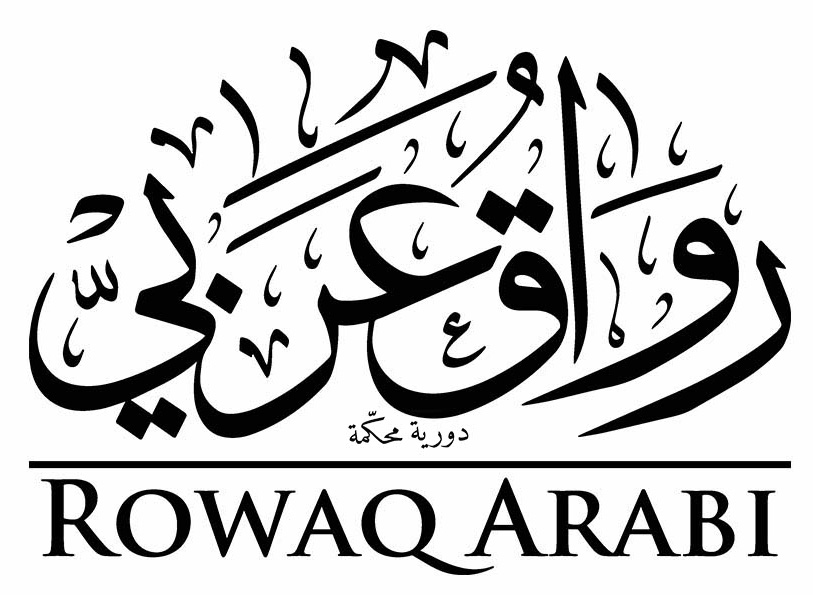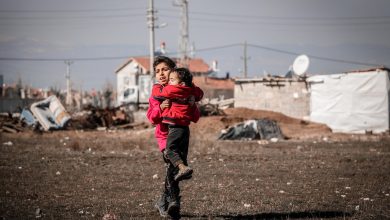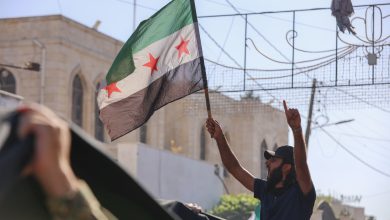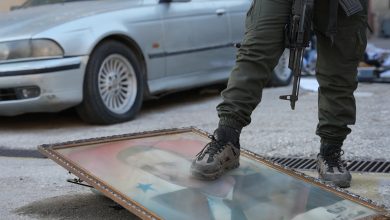Views: Tunisia’s New Constitution, from Averting an ‘Imminent Threat’ to Regime Change
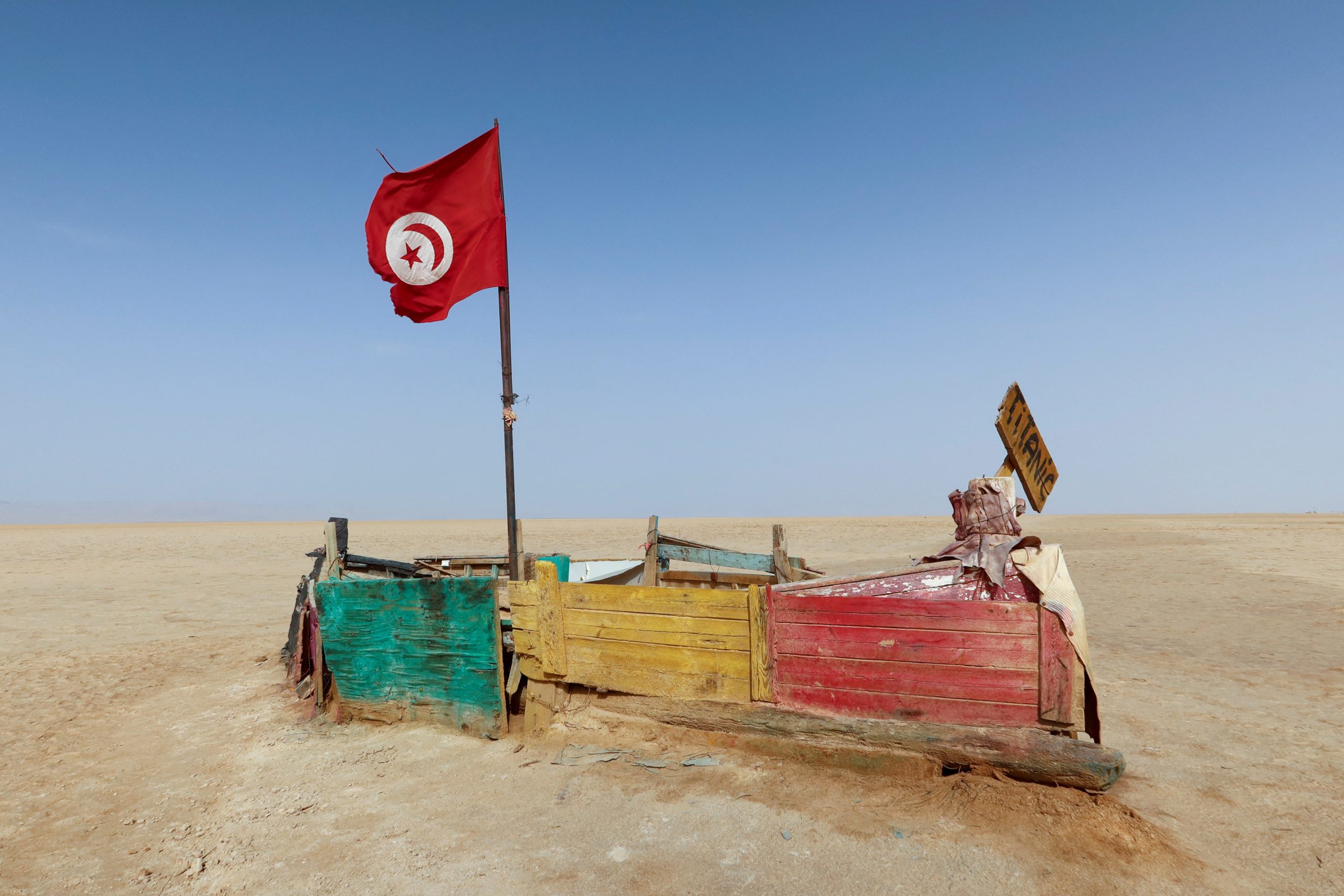
Citation: Romdhani, Messaoud (2022) ‘Views: Tunisia’s New Constitution, from Averting an ‘Imminent Threat’ to Regime Change’, Rowaq Arabi 27 (2), pp. 51-62, https://doi.org/10.53833/BCUN9650
On 25 July 2021, Kais Saied froze the Tunisian parliament, dismissed the elected government, and began running state affairs by decree, all on the basis of an arbitrary interpretation of the ‘imminent threat’ mentioned in Article 80 of the 2014 constitution. These measures were simply the beginning of a unilateral path, to be followed by a national e-consultation made up of leading questions and culminating in a referendum on a constitution that would establish an autocracy with no checks and balances or guarantees for basic liberties.
The text of the constitution of 25 July 2022 came as a surprise, even to the law professors Kais Saied tasked to draft it. Although the president edited the first version, issued on 30 June 2022, correcting some linguistic and syntactic errors and clarifying several points, the revised text did not put an end to criticisms or concerns. These concerns revolved around the absolute authorities Saied had given himself and the ambiguity of specific provisions, which would allow them to be interpreted in accordance with the whims of the person in power—namely, the president. Fears of a more explicitly theocratic state were also raised by Article 5, which described Tunisia as part of the ‘Islamic nation’ and provided for the role of ‘the purposes of Islam’ in legislation. Many experts drew attention to the danger of this article, calling it ‘a mortal blow’ to enlightened Tunisian nationalism[1]; the Islamic nation to which Saied refers in his many speeches and his constitution ‘exists only in the collective imagination’.[2]
‘Imminent Threat’ As a Vehicle to Autocracy
On 23 October 2019, after his overwhelming victory against Nabil Karoui in the presidential election, Kais Saied took the oath of office, swearing to be faithful to the nation and respect the constitution, in line with Article 76 of the 2014 constitution. After taking office, the president frequently locked horns with the government and parliament over the definition of his and their authorities. On 25 July 2021, he cited Article 80 of the constitution to dismiss the government, freeze parliament, and lift immunity from MPs, in an authoritarian reading of the constitutional text. Article 80 permits the president to take ‘measures necessitated by the exceptional situation’ in the event of ‘an imminent threat to the nation and to the security and independence of the country’. Saied’s reading of the article disregarded the proviso requiring him to ‘consult the prime minister and the speaker of the Assembly of the People’s Representatives’ and keep the parliament in permanent session, as well as the clause stating that ‘these measures aim to secure the return of the normal conduct of state as soon as possible’. In taking these actions, the president exploited dire economic conditions, a serious public health crisis, and popular outrage at petty political conflicts, especially within parliament, which had become an arena for physical and moral violence.
In pursuit of greater unilateral authority unfettered by laws, on 22 September 2021, Kais Saied issued Presidential Order 117/2021 on the exceptional measures, which set the 25 July 2021 course, in which the affairs of state would be administered solely by presidential edict.
Since then, multiple parliamentarians and politicians have been arrested without legal basis; civilians have been successively prosecuted in military tribunals for criticising the president; travel bans have been issued for MPs and politicians without judicial warrants; independent authorities have been suspended, including the Supreme Anti-Corruption Authority; the elected Supreme Judicial Council has been dissolved and replaced with an appointed council, and dozens of judges have been dismissed on vague charges and without recourse to disciplinary bodies.[3] After all this, it became apparent to many observers that the aim was not to confront the imminent threat, but to consolidate presidential rule by giving the president all prerogatives and clearing the political and judicial arena of any moderating structures or counter-authority that may check Saied’s ambition to change the constitution and the system of government. The steps in this transition were announced in a ‘roadmap’ on 13 December 2021 and included an online consultation, a referendum on a new constitution, and early legislative elections.
A National E-Consultation as a Prelude to the New Constitution
The national consultation was launched in January 2022 and continued until 20 March 2022, Tunisia’s Independence Day. It faced numerous criticisms because of the nature of the ‘superficial’ questions and the leading wording they used. Al-Mouladi al-Qasoumi, a professor of sociology, told Alqatiba, ‘We’re talking about a consultation that does not even contain the substantive elements of consultation, from the structure and nature of the questions to the procedures it relied on, because it comes from an unknown group that posed a set of pointed questions’.[4] The consultation neglected to provide guarantees protecting participants’ personal data and excluded a significant number of citizens who do not have an internet connection or a phone account in their name. Despite the low participation rate—no more than 534,000 of over seven million voters, or six per cent of the electorate took part—the president considered the process a success ‘despite unprecedented attempts to malign and cast doubt on it’. The national consultation found that 86.4 per cent of participants wanted a presidential system, which happens to accord with Kais Saied’s wishes as well.
In addition to questions tailored to suit the president and the lack of privacy protections, the consultation process was overseen by various state ministry staff and members of Kais Saied’s coordination committees who ‘volunteered’ and ‘were given cars, tablets, and smart phones to tour various regions of the republic and register citizens, in a flagrant violation of the confidentiality of citizens’ personal data’.[5] Civil society, such as the ‘I WATCH’ organisation, condemned ‘the use of state resources and the squandering of state funds to prepare a national, purely formal consultation in service of the president’s pet project’.[6]
But neither meagre participation in the consultation, nor the cries of civil society demanding a genuine, multidimensional national dialogue to find pragmatic solutions for the nation’s crisis, nor foreign pressures to return to the democratic path, deterred Kais Saied in pursuit of his goal—personally motivated it seemed—of establishing a presidential system that would rid him of all the counter-authorities that had challenged his authority so many times during his presidency.
A New Constitution: Why?
Before assigning a consultative committee to draft a new constitution to be put to a popular referendum, Kais Saied smoothed the way by criticising the 2014 constitution, written by the elected National Constituent Assembly (NCA) after a prolonged dialogue with experts in constitutional law and sociology and after much pressure from civil society groups. These groups compelled the assembly’s majority party, Ennahda, to accept several articles that clearly provided for a civil state, guaranteed civil and individual liberties (including freedom of belief and conscience), provided for full equality between the sexes, and explicitly invoked the revolution to consolidate justice in public bodies through affirmative action and among the citizenry through an equitable fiscal policy.
Fearing the return of dictatorship and seeking to prevent the monopolisation of power, the framers of the 2014 constitution established a modified parliamentary system that gave broad powers to the elected parliament, allowing it to appoint the prime minister, pass laws, and discuss the state budget. It gave the president significant authorities as well, such as overseeing national defence and foreign policy and appointing the ministers for those two portfolios.
Suddenly, on 9 December 2021, four months after the exceptional measures were instituted, and during a meeting with several constitutional legal scholars who supported the measures and Saied’s unilateral path, the president said that the 2014 constitution ‘is no longer viable. It cannot remain in force because it has lost legitimacy, and it must be replaced with a legal solution’. The president did not then explain why it was unviable, except to say that it ‘is not based on the will of the people’.[7] Later, while visiting the city of Gabès in southern Tunisian on 14 March 2022, he spoke more clearly, blaming the parliamentary system for all the country’s crises: ‘If it [the system of government] were a presidential system, conditions would not have reached this level of destruction and ruin’.[8]
Many experts and observers of Tunisian affairs agree that in the years before and after Kais Saied’s exceptional measures, there was a crisis of governance because of the division of power between three poles (the presidency, parliament, and government), which at times made the normal operation of state affairs and the avoidance of political tensions difficult. Nevertheless, the current situation demonstrates that the crisis is more profound than merely the distribution and fragmentation of authority. Its main cause is low political awareness among those in government and their inability to resolve the social and economic problems that underlay the 2010–2011 revolution and have bred frustration and resentment among the general populace.
Consultative Committees as Camouflage?
On 1 May 2022, the president tapped al-Sadiq Belaid, a professor of constitutional law and the former dean of the Faculty of Law, to chair a consultative commission to draft a new constitution for ‘a new republic’, which would be put to a referendum on 25 July 2022, on the one-year anniversary of Kais Saied’s exceptional measures. The commission included three committees: the Consultative Committee on Economic and Social Affairs, the Legal Committee, and the National Dialogue Committee. Most political parties and major organisations, like the Tunisian General Labour Union (UGTT), boycotted the latter committee. Deans of schools of law, the legal sciences, and political science refused to take part in the dialogue and the Consultative Legal Committee, expressing their commitment to ‘the neutrality of universities and the need to keep them separate from politics’.[9]
At the same time, Brahim Bouderbala, the head of the National Bar Association and the chair of the Consultative Committee on Economic and Social Affairs, came in for much criticism because of his lack of subject-matter expertise. Many former Bar Association presidents rejected the idea of ‘getting the institution embroiled in a sham dialogue’ and considered Bouderbala’s participation to be inconsistent with ‘the Bar’s spotless history of standing as a bulwark in the face of every abuse of power, infringement of rights, and targeting of liberties’.[10]
Despite the criticism and at times scathing ridicule he faced, al-Sadiq Belaid, the coordinating chair of the National Commission for a New Republic, was enthusiastic about writing a new constitution, believing it ‘necessary to save the country from a stifling crisis of many years’. Seeing the crisis as a result of ‘parties with a religious reference in power’, he said that the first step would be to drop the clause in the 2014 constitution making Islam the state religion’.[11]
On 20 June, Belaid seemed relaxed as he submitted the draft of the constitution he and his team had prepared to the president, commenting that they had finished the final draft by the deadline. Nevertheless, he seemed not to notice specific qualifications issued by Saied, who said that the proposed version ‘is not final’ and ‘some sections are subject to revision and further reflection’.
‘A Mission of Truth Meant to Serve a Lie’[12]
It later became clear that it was not a matter of a handful of articles, but another version of the constitution entirely, unrelated to the draft proposed by the commission. In an article published in al-Sabah,[13] Belaid explained that despite criticism and pressure ‘from every quarter’, he and his expert committee had risen to the challenge and drafted ‘a version worthy of the Tunisian people’. While allowing that the president is entitled to make ‘partial, light revisions’, what was published in the Official Gazette was entirely another text ‘unconnected to the text we drafted and submitted’. He warned that the president’s published draft contains ‘serious risks and barriers to lay the groundwork for reprehensible dictatorial rule’ and places the president beyond all accountability.[14]
The President Amends His Constitution
On Friday, 8 July, the Official Gazette issued Presidential Order 607/2022 correcting ‘errors that had made their way into’ the draft constitution published under Presidential Order 578. In a speech the evening of the Eid, the president said that errors ‘are common in the publication of other legal statutes’, however in this case, the ‘errors’ corrected extended to forty-six sections and thirty-nine articles. The corrections ranged from fixing spelling mistakes and eliminating repetition, to making important gender-related additions and revisions on provisions for voting rights and candidacy. The section on presidential candidacy now specifies male and female candidates instead of simply ‘candidates’, marked as masculine. A condition requiring compliance with public morals was omitted from Article 55 on rights and liberties due to concerns, while the phrase ‘in the framework of a democratic system’ was added to the controversial Article 5, which makes the state ‘exclusively’ responsible for the duty of working ‘to achieve the purposes of Hanafite Islam as related to the preservation of life, honour, wealth, religion, and freedom’.
The amendments came after protests by much of the enlightened public and even discontent by supporters of the president who had backed him based on their obvious hostility to the political Islam represented by the Ennahda movement. This segment of Saied supporters was shocked to see the version presented on 30 June referring to the purposes of Islam, considered ‘a major retreat from the gains of the 2014 constitution’ related to the civil state.[15]
The changes Saied made to his constitution raised concerns not only about the religious state but also about the expansive political and punitive powers given to the president. Previously possessing only limited authority under the 2014 constitution, the president now possessed all prerogatives and was not subject to accountability either during or after his presidency.
A Chasm between the 2014 Constitution to Kais Saied’s Constitution
It is important to recall the circumstances in which the 2014 constitution was ratified by the NCA, where the Islamist Ennahda movement held a majority. Street activism, political parties, civic organisations, and the feminist movement all successfully lobbied for changes to the original text to make this constitution, despite its flaws and shortcomings, a reflection of the aspirations of a society that had just staged a revolution against dictatorship and the basis of a democratic, civil state with a social welfare dimension. Successive street protests brought many gains. The provision making Islamic law (shari‘a) a source of legislation was omitted, and absolute equality between men and women was enshrined in the text, after the Ennahda-proposed formulation of ‘gender complementarity’ was dropped. The constitution also explicitly affirmed freedom of belief and conscience.
In the preamble to his constitution, Kais Saied made no reference to either the 1959 or 2014 constitution. He did invoke, however, the constitution of ancient Carthage and went on at some length about the seventeenth-century ‘Mizan [balance] Constitution’, describing it as ‘among the most important constitutional texts…written by Tunisians who believed in the values of justice’. According to historians, however, this constitution is ‘a fiction’ and to read it as a real constitution is a fundamental category error; this ‘constitution’ was no more than ‘a fiscal register that contained the first census of the population’s property and the taxes levied on them’ by the Ottoman state.[16]
Despite this oversight, the new constitution does incorporate parts of the 1959 and 2014 constitution. For example, it takes articles 2 and 20 from the 2014 constitution on rights and liberties, as well as Articles 21 and 23 on men’s and women’s equal rights and duties (also mentioned in Article 6 of the 1959 constitution). It also borrows from the 2014 text Article 25 on state protection for human dignity. A quick calculation shows that ‘more than 60 per cent of the draft constitution is directly adopted from articles and provisions in the 1959 and 2014 constitutions’,[17] despite the president’s disregard of these texts in his new preamble—a disregard that reveals ‘a hostility to and disdain for the public policy of the post-independence state and a manipulation of national memory’.[18]
The Purposes of Shari‘a or the Purposes of Kais Saied?
When the NCA was drafting the 2014 constitution, there was a prolonged discussion of Article 1 of the 1959 constitution, which makes Islam the state religion. Ultimately, this formulation was retained,[19] but to avoid any ambiguity about the role of religion in public life, a second article was added recognising the civil nature of the state, citizenship, and the will of the people.[20] Although the relationship between articles 1 and 2—the relationship between Islam as a state religion and the civil state—remained somewhat vague, civil society and liberal parties saw it as a compromise solution that reflected concessions by both Islamists and secularists.
Kais Saied’s constitution, however, goes further than Article 1. Although it does not refer to Islam as the state religion, it considers Tunisia part of the Islamic nation and states that the state alone shall work ‘to achieve the purposes of shari‘a’. The addition of the phrase ‘in the framework of a democratic system’ did not allay all fears. The idea of the Islamic nation is vague and confused, particularly since religion is the sole basis for membership. I think that Dr. Wahid Ferchichi, a professor of constitutional law, was correct when he called it ‘an amorphous understanding’[21] of the state with a religious reference. Such an understanding eclipses the citizen and restricts his liberty, even crushes it, because this nation ‘does not guarantee individual freedom except within the bounds of what its beliefs permit’.[22]
With this, and with the aforementioned Article 5, it may be understood that the president is seeking to pull the rug out from under the Islamist Ennahda movement, to make it illegal, insofar as the state has a monopoly on Islam.
Nevertheless, I believe that Saied maintains his own conservative, religious guiding reference, which he has expressed on numerous occasions. It can be gleaned not only from the way he performs the Friday prayer in front of television cameras, the way he speaks with worshippers and offers them a mixture of religious and political homily, and the way he compares himself to Omar Ibn al-Khattab, whom he has quoted multiple times. We should also reread his famous interview with the weekly Acharaa al-Magharebi, where he gives voice to most of his religious and political beliefs.[23] He said he had run for president reluctantly, as a kind of jihad, seeing himself as a warrior for God and recalling the Quranic verse, ‘Fighting has been prescribed for you, though it be hateful to you’ (al-Baqara 216). Speaking of shari‘a, he said that the state should be working to achieve its purposes of preserving life, honour, wealth, religion, and liberty. He rejected the designation of Ansar al-Shari‘a—a group that has claimed several assassinations in Tunisia—as a terrorist organisation, and said that homosexuality is not a sexual orientation but rather ‘a foreign conspiracy’ aimed at weakening the nation.[24]
But is Article 5 of Saied’s constitution consistent with the article providing for freedom of belief? In my view, it is a contradiction that conceals an ever-present, hidden religious conviction, either to justify oppression or to pull the carpet out from under religious currents. Here I agree with Dr. Naila al-Sliti, who says, ‘In our contradictions, we strike at certain articles with others’. Behind our liberated façade lies the ‘dagger’ of religious fanaticism and our authoritative references, and we impede our connection to states that believe in democracy and freedom and ‘have no religion but international laws and human rights’.[25]
Kais Saied’s constitution is based on three religious, conservative pillars: the condition that the president be Muslim; the purposes of shari‘a as an authoritative reference for statutory law; and the recognition of the family as ‘the basic unit of society’, which the state is obliged to protect (Article 12). All of these are basic terms of reference for conservative regimes everywhere and are ‘embraced by dictatorships of all kinds, particularly right-wing ones’. The consequence will be ‘conservative, moralising, religious legal systems and public policy’.[26] Add to this that the president, who authored the constitution, enjoys unlimited authorities, and the danger is compounded.
Everyone Accountable to an Unaccountable President
It should be recalled that the 2014 constitution, enacted after a revolution against the absolute authority of President Ben Ali, purposefully curtailed executive power, creating a balance between the three branches of government—executive, legislative, and judicial—and establishing oversight institutions to prevent one branch from encroaching on the others. It also provided for a constitutional court to maintain the rule of law and resolve legal issues and disputes.
Kais Saied’s constitution did away with all these regulatory and constitutional bodies: the Audio-visual Communications Authority (which ensures the neutrality and independence of media and oversees professional press ethics), the Supreme Anti-Corruption Authority, the Sustainable Development Authority, and the Human Rights Authority. It retains only the Elections Authority, whose members were appointed by presidential decree prior to the referendum and thus lacks autonomy.
Saied’s constitution is grounded in a slogan he has repeated for several years: ‘The people want’. Before Saied appeared on the scene, it was heard in the demonstrations of December 2010 and January 2011 before Ben Ali fled the country. Saied interprets it to mean that sovereignty is vested in the people, who have the power to decide and rule. They do not need mediating bodies or civil society to amend or exercise oversight; rather they have a direct link to a ‘sincere and faithful’ president who gives expression to their will, aspirations, and desires. The president is thus not subject to accountability (Article 110), and the new constitution provides for no process to remove him for grave infractions, similar to Article 88 of the 2014 constitution. In Saied’s constitution, the president can dissolve parliament (Article 106), appoint and dismiss the government (articles 101 and 102), appoint judges (Article 120), and propose amendments to the constitution. He also nominates members for the Constitutional Court and can declare an open-ended state of emergency and exception without consulting any other state body (Article 96).
Contrary to some views, then, we are not talking about a lopsided balance of powers, but the erasure of all other powers and the deliberate omission of all oversight and regulatory structures. We will soon witness the formation of two assemblies, one legislative and the other a regional council. Absent the specification of their authorities, they may compete, and it will be up to the president to define their roles. Considering Saied’s previous analyses of grassroots democracy, as articulated in the interview mentioned above and elsewhere,[27] the legislative council will likely remain weak and perhaps subordinate to the regional council, as the bearer of ‘grassroots democracy’. But what impact will this have on civil and individual liberties and human rights?
Implications for Freedoms and Human Rights
If we consider the preamble an important part of the constitution which, as indicated by the constitution of 27 January 2014, positions and orders the rest of the articles, we observe that the preamble of Kais Saied’s constitution contains no explicit reference to the universality of human rights, the civil nature of the state, the neutrality of the Tunisian state bureaucracy, judicial independence, or equality between men and women. This stands in contrast to the version published by al-Sadiq Belaid,[28] which invokes universal human rights, the state’s social welfare role and its civil nature, judicial independence, and the separation of powers. The preamble to Saied’s constitution asserts the correction of the revolutionary course and affirms its commitment to Arab identity and the human dimensions of Islam. Who will enforce these dimensions? The president, mufti, or judge? What is the fate of non-Muslims? Is the commitment to ‘the human dimensions of religion’ not a prelude to Article 5 and all its ideological cargo, a reference to the religious bond uniting all individuals within the nation? In other words, are citizenship rights linked to belonging to the Islamic nation?
The reader of the preamble and the rest of Saied’s constitution is right to fear for the civil state, which has no place in it, and there is similarly no emphasis on the concept of citizenship and its associated rights and duties. This constitution was written in the name of the people ‘whose revolution was stolen’, but the people’s ‘real revolutionary’ history began on 25 July 2021. Accordingly, in the face of the power and will of the masses, there is no place for a dissenter; the individual is dissolved into various alternate collective entities: the nation, family, or society.
Here, too, we cannot avoid a comparison with the 2014 constitution, even after Saied’s constitution was amended. Article 49 of the 2014 constitution makes controls on the exercise of rights and liberties subject to ‘the exigencies of a civil, democratic state’. The constitution upholds the principle of proportionality for any regulation of rights, and tasks the judiciary with protecting them from infringement. In contrast, Saied’s constitution, while it adopts some of this formulation in Article 55, nevertheless omits the reference to the civil, democratic state and instead makes the exercise of rights and freedoms subject to ‘the exigencies of public security, national defence, and public health’. Even after the phrase ‘public morals’ was struck from this list, the passage still carries a real risk of authoritarianism, and this danger is heightened by three things: the concept of public security, Article 5 on the role of shari‘a, and the all-powerful president who is accountable to no one, even if he violates the rights of his citizens.
In contrast to the multiple references to religious foundations and authorities, the new constitution does not affirm a universal reference for human rights. Experts and analysts believe that ‘the ambiguous reference to the civil state and the broad powers Saied has granted to himself in the constitution’ suggest that ‘domestic legislation concerning international human rights conventions will be submitted’.[29]
Low Turnout and Serious Challenges
The referendum held on 25 July 2022 saw low turnout of no more than 27.5 per cent of the Tunisian electorate, of whom 92 per cent endorsed the constitution. The referendum also witnessed several irregularities,[30] including a speech by the president himself that violated the moratorium on campaigning. Addressing the Tunisian people while casting his vote,[31] the president expounded on the positive attributes of the constitution for more than fifteen minutes, in a speech broadcast on national Channels 1 and 2. Despite the low turnout and the irregularities, which the Elections Authority did not believe ‘rise to the level of election crimes’, Saied’s constitution was approved and entered into force after the announcement of the referendum results. This is in accordance with Article 139 of the constitution, which does not set a minimum threshold of participation as is common in democratic countries.
The overwhelming majority of Tunisians, save for the relatively small segment who boycotted the referendum due to moral conviction,[32] are far less interested in constitutional and political changes than in the difficulty of their daily lives. Inflation has reached the unprecedented level of 8 per cent, and poverty has spread to touch much of the middle class. Outmigration has increased as well, as Tunisians are fearful for the country’s uncertain future, all in a difficult political climate of ever more frequent violations and the mounting repression of liberties.[33] ‘With this constitutional referendum, the exception becomes the norm’, Le Monde warned in an editorial.[34]
An additional observation must be made on the referendum: the number of voters who turned out is very similar to the number of people who voted for Saied in the second round of the presidential election in 2019.[35] If we consider the referendum to be more like a pledge of allegiance to Saied personally,[36] we can conclude, despite the different electoral contexts, that Saied’s base has not grown, but has in fact diminished. Could this be ‘enough to persuade Kais Saied of the need to retreat from his authoritarian project’?[37] Likely not, but it may be that his constitution will end when his time in power does.
Confronting Saied’s Measures: Support, Hesitation, Division
In the hours and days after Kais Saied’s coup against the constitution on 25 July 2021, the response of many political parties, civil society organisations, and the UGTT (itself able to tip the balance of forces) was shocking, ranging from support for his decisions to delicately expressed reservations combined with a wait-and-see attitude. The coup was rejected outright by only a few small civil society groups, national figures, and parliamentary parties, and a handful of MPs who lost their office as a result. The swing between support, hesitation, and confusion encouraged Saied to press on and enforce the exceptional measures, rule by decree, and ultimately draft a constitution that realised his own personal ambitions and his particular vision of ‘grassroots’ democracy. Even months after the constitutional coup, when everyone had realised the president’s true intentions, the opposition remained divided even during its protests. Civil society organisations have continued to condemn the near daily violation of and assault on basic liberties, sometimes penning press statements and at other times staging small street protests. Until the legislative elections slated for December 2022, Kais Saied will continue to determine the legal and statutory framework for the elections, which most or all opposition parties may decide to boycott. It is certain, however, that Saied, who has decided to pursue unilateral rule, will bear the repercussions of the crushing economic and fiscal crisis that continues to cast its shadow on the country and may yet have unanticipated consequences even for Saied himself.
This article is originally written in Arabic for Rowaq Arabi
[1] Al-Radisi, Hamadi (2022) ‘Fi al-Fasl al-Khamis min Mashru‘ Dustur 2022 al-Umma, al-Dawla wa-Maqasid al-Islam’ [On Article 25 of the Draft 2022 Constitution for the Nation, the State and the Purposes of Islam], Le Maghreb, 16 July, accessed 20 July 2022, t.ly/sEHK.
[2] Ibid.
[3] Business News (2022) ‘al-Ittihad al-Dawli li-l-Qudah: ‘Azl 57 Qadiyan Yu‘add Kharqan Jasiman li-l-Qawa‘id al-Asasiya li-Dawlat al-Qanun wa-l-Mu’assasat’ [International Federation of Jurists: Dismissal of 57 Judges Is a Grave Violation of the Basic Precepts of the Rule of Law and Institutions], 16 June, accessed 23 July 2022, t.ly/UOsR.
[4] Zaghdoudi, Malik (2022) ‘al-Istishara al-Ilaktruniya fi Tunis: Hilm al-Ta’sis Yartatim bi-Sha‘b La Yurid’ [Digital Consultation in Tunisia: The Dream of Establishment Runs Up Against a People Who Do Not Want]’, Alqatiba, 1 April, accessed 23 July 2022, t.ly/PXIJ.
[5] I Watch Organisation (2022) ‘al-Istishara al-Wataniya: Du‘f Fadih fi al-Takhtit’ [The National Consultation: Abysmally Weak Planning], 16 March, accessed 22 March 2022, https://www.iwatch.tn/ar/article/916.
[6] Ibid.
[7] Mosaique FM (2021) ‘Ra’is al-Dawla: Dustur 2014 Lam Ya‘ud Salihan wa-La Mashru‘iya Lahu’ [President: The 2014 Constitution Is No Longer Viable and Has No Legitimacy], 9 December, accessed 23 July 2022, t.ly/gKVw.
[8] Al-Arab (2022) ‘Qays Sa‘id Yara fi al-Nizam al-Ri’asi al-Hall li-Azmat Tunis fi al-Hukm’ [Kais Saied Sees the Presidential System as a Solution to Tunisia’s Crisis of Governance], 14 March, accessed 24 July 2022, t.ly/eNcO.
[9] Mosaique FM (2022) ‘Jami‘iyun wa-‘Umada’ Kulliyat al-Huquq: La li-l-Zajj bi-l-Jami‘a fi al-Mashari‘ al-Siyasiya’ [Professors and Deans of Faculties of Law: No to Dragging Universities into Politics], 23 May, accessed 24 July 2022, t.ly/uYez.
[10] Al-Shuruq (2022) ‘‘Umada’ Sabiqun li-Hay’at al-Muhamiyin Yatalibun Bu Darbala bi-l-Insihab min al-Lajna’ [Former Heads of Bar Association Call on Bouderbala to Withdraw from the Committee], 23 May, accessed 23 May 2022, t.ly/lkDy.
[11] France 24 Arabic (2022) ‘al-Sadiq Bal‘id: Mashru‘ al-Dustur al-Tunisi al-Jadid Lan Ya’ti ‘ala Dhikr li-l-Marja‘iya al-Islamiya’ [al-Sadiq Belaid: The New Tunisian Constitution Will Not Mention an Islamic Reference], 7 June, accessed 24 July 2022, https://www.youtube.com/watch?v=gPiCdgQkzl4.
[12] Belaid, al-Sadiq (2022) ‘Mahammat Haqq Urid bi-ha Batil’ [A Mission of Truth Meant to Serve a Lie], 3 July, accessed 3 July 2022, https://bit.ly/3e2DU05
[13] Ibid.
[14] Ibid.
[15] Al-Ish, Mahdi (2022) ‘al-Ra’is Yu‘adil Dusturah qabl al-Istifta’: ‘Abath wa-Dharr li-l-Rimad ‘ala al-‘Uyun’ [The President Amends His Constitution before the Referendum: A Fruitless Smokescreen], The Legal Agenda, 11 July, accessed 24 July 2022, t.ly/yskV.
[16] Labid, Salem (2022) ‘al-Istinjad bi-Tarikh wa-I‘adat al-Sultawiya fi al-Dustur al-Jadid’ [Evoking History and Restoring Authoritarianism in the New Constitution], al-Araby al-Jadid, 25 July, accessed 11 August 2022, https://bit.ly/3Bn6ErG.
[17] Ferchichi, Wahid (2022) ‘Li-Hadha Narfud Dustur Qays Sa‘id’ [This Is Why We Reject Kais Saied’s Constitution], Tunisian Association for the Defence of Individual Liberties.
[18] Ibid.
[19] Article 1 of the 2014 Tunisian constitution states, ‘Tunisia is a free, independent, sovereign state. Its religion is Islam, its language Arabic, and its system of governance a republic’.
[20] Article 2 states, ‘Tunisia is a civil state based on citizenship, the will of the people, and the supremacy of law’.
[21] Ferchichi, Wahid (2022) ‘Reasons for Rejecting Kais Said’s Consitution’, The Legal Agenda, 12 July, accessed 23 July 2022, https://bit.ly/3y8H74I
[22] Ibid.
[23] Zantour, Kawthar (2019) ‘al-Shari‘ al-Magharibi Tanshur Hiwar Qays Sa‘id Kamilan’ [Acharaa al-Magharebi Publishes Full Interview with Kais Saied], Acharaa al-Magharebi, 11 June, accessed 12 June 2022, t.ly/TlwP.
[24] Ibid.
[25] Al-Sliti, Naila (2022) ‘al-Fasl al-Khamis: Inna Hiya Illa Nar Muwaqqada’ [Article 5 Is a Lit Match], Acharaa al-Magharebi, 19 July.
[26] Ferchichi, ‘Li-Hadha Narfud Dustur Qays Sa‘id’.
[27] Zantour.
[28] Belaid.
[29] Al-Jourshi, Salah Eddin (2022) ‘Ba‘d Tamrir al-Dustur Tunis Tattajih nahw Ma’ssasat al-Hukm al-Fardi’ [After the Passage of the Constitution Tunisia Is Headed towards Institutionalising Autocracy], Network of Arab Development NGOs, 1 August, accessed 11 August 2022, https://bit.ly/3Swi18d.
[30] Al-Warfali, Majdi (2022) ‘Ikhlalat wa-Naqa’is wa-Tajawuzat Yawm al-Istifta’: Kharq al-Samt al-Intikhabi wa-Naqs Fadih fi ‘Adad al-Mulahizin wa-Tadyiqat ‘ala al-Sahafiyin’ [Irregularities, Shortages, and Flaws on Referendum Day: Violation of Campaigning Moratorium, Extreme Shortage of Observers, and Harassment of Journalists], Le Maghreb, 26 July, accessed 11 August 2022, ibit.ly/wonz.
[31] Euro News (2022) ‘Fidyu: Hadha Ma Qalahu Sa‘id fi Yawm al-Istifta’ ‘ala Dustur Jadid Muthir li-l-Jadal’ [Video: This Is What Saied Said on the Day of the Referendum on a New Controversial Constitution], 25 July, accessed 25 July 2022, https://arabic.euronews.com/2022/07/25/video-kais-saied-statement-tunisia-referendum-day.
[32] Krishan, Ziad (2022) ‘Istifta’ hawl al-Dustur am Mubaya‘a li-Qays Sa‘id’ [A Referendum on the Constitution or an Oath of Allegiance to Kais Saied?], Le Maghreb, 26 July, accessed 26 July 2022, ibit.ly/FvsT. According to Sigma, which conducted a survey, 21 per cent of the electorate boycotted the referendum, while some 50 per cent did not care about it.
[33] Amnesty International (2022) ‘Tunisia: A Year of Human Rights Regression Since President’s Power-Grab’, 21 July, accessed 24 July 2022, https://www.amnesty.org/en/documents/mde30/5876/2022/en/.
[34] Le Monde (2022) ‘Kais Saied’s Dangerous Plan for Tunisia’, 26 July, accessed 26 July 2022, ibit.ly/lPdK.
[35] In the 2019 election, Saied got 1.7 million votes, while his constitution was approved by some 1.6 million voters.
[36] According to a survey by Sigma. See: Krishan.
[37] Le Monde.
Read this post in: العربية
